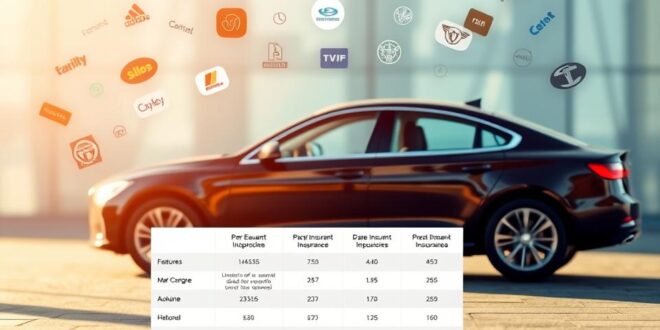Table of Contents
Finding the right car insurance can be tough with so many choices. It’s key to compare what different insurance providers offer. This helps you make a smart choice.
When comparing car insurance companies, look at several things. Check out their coverage, how much you’ll pay, deductibles, and how well they treat customers. Knowing these details helps you pick a policy that’s right for you and your wallet.
Key Takeaways
- Understand the different types of car insurance coverage available.
- Compare premiums and deductibles from various insurance providers.
- Evaluate the customer service reputation of insurance companies.
- Consider additional features such as roadside assistance and rental car coverage.
- Read reviews and ask for recommendations to make an informed decision.
Understanding Car Insurance Coverage Types
It’s important to know the different car insurance coverage types. Car insurance can be complex, but understanding its parts makes it easier.
Liability Coverage Explained
Liability coverage is a key part of car insurance, needed by law in many places. It covers damages to others if you’re at fault, like medical costs and property damage.
There are two main types: bodily injury liability and property damage liability. Bodily injury liability pays for medical bills and lost wages if you hurt someone. Property damage liability covers repairs or replacement of the other party’s vehicle or property.
Comprehensive and Collision Coverage
Comprehensive and collision coverage protect your car from different risks. Collision coverage pays for damages if you’re in an accident, no matter who’s at fault. Comprehensive coverage covers damages not from accidents, like theft, vandalism, or natural disasters.
These coverages are optional but wise, mainly for newer or more valuable cars. They help avoid big repair costs if your car gets damaged.
Additional Protection Options
There are additional protection options beyond basic coverages. These include:
- Personal Injury Protection (PIP): Covers medical costs for you and your passengers, no matter who’s at fault.
- Uninsured/Underinsured Motorist Coverage: Protects you if hit by someone without insurance or not enough insurance.
- Roadside Assistance: Helps if your car breaks down, with towing, fuel delivery, and lockout service.
- Rental Reimbursement: Covers rental car costs if your vehicle is being fixed due to a covered claim.
These extra options can make your car insurance policy better. They offer more protection against various risks.
How to Evaluate Insurance Provider Quality
When looking at insurance provider quality, there are key factors to consider. It’s not just about the cost. It’s about the value and service you get. Knowing these factors helps you make a smart choice that fits your needs.
Financial Strength and Stability Ratings
Financial strength and stability are critical. Companies with strong finances can pay claims quickly. Rating agencies like A.M. Best, Moody’s, and Standard & Poor’s give ratings to help you choose. These ratings show if the company can meet its financial promises.
A.M. Best ratings go from A++ to F, with A++ being the best. A high rating means the company is financially stable. Here’s a quick look at the top rating agencies’ scales:
| Rating Agency | Highest Rating | Lowest Rating |
|---|---|---|
| A.M. Best | A++ | F |
| Moody’s | Aaa | C |
| Standard & Poor’s | AAA | D |
Customer Satisfaction Scores
Customer satisfaction is also key. It shows how well an insurer treats its customers. J.D. Power and others study customer satisfaction in areas like policy, price, and service.
“Customer satisfaction shows an insurer’s dedication to its customers. High scores often mean better service and claims handling.”
Claims Process Efficiency
The claims process is very important. A smooth process can make a tough time easier. Look for insurers with easy claims filing, clear communication, and quick payouts. Some even have mobile apps to help with claims.
By looking at financial strength, customer satisfaction, and claims process, you can fully evaluate auto insurance companies. This detailed look helps you pick an insurer that meets your financial needs and offers great service and support when you need it.
Step-by-Step Guide to Comparing Quotes
To find the best car insurance, comparing quotes from different providers is key. Here’s how to do it right.
Gathering Your Personal Information
Before comparing car insurance quotes, gather all needed personal info. This includes your driver’s license number, vehicle ID number (VIN), and your driving history.
Having this info ready makes comparing easier and ensures accurate quotes.
Using Online Comparison Tools
Online tools are great for comparing car insurance quotes from many providers at once. They let you input your info once and get quotes from several companies.
Popular sites for insurance comparisons are available. Make sure to give accurate info for the best quotes.

Speaking with Insurance Agents
Online tools are handy, but talking to insurance agents offers insights and tailored advice. Agents can explain policy details and options.
When talking to an agent, ask about coverage, deductibles, and any extra fees.
Comparison Table: Key Factors to Consider
| Insurance Provider | Coverage Options | Deductible | Monthly Premium |
|---|---|---|---|
| Provider A | Liability, Comprehensiv, Collision | $500 | $120 |
| Provider B | Liability, Comprehensiv | $250 | $100 |
| Provider C | Liability, Collision | $750 | $150 |
By following these steps and looking at the comparison table, you can compare car insurance quotes well. This helps you find the best coverage for your needs.
Top Car Insurance Companies for Different Drivers
Drivers have different needs when it comes to car insurance. Some companies do a better job than others in meeting these needs. Whether you’re looking for great value, affordable rates, or coverage for those with poor credit or accidents, there’s a company for you.
Best for Overall Value
USAA and Geico are great for those wanting a good balance of cost and coverage. USAA is known for its excellent service and wide range of coverage. Geico, on the other hand, has competitive prices and an easy-to-use policy management system.
Best for Budget-Conscious Drivers
Progressive and Root Insurance are good for those on a tight budget. Progressive lets you name your price, while Root Insurance gives discounts to safe drivers based on telematics.
| Insurance Company | Average Annual Premium | Notable Feature |
|---|---|---|
| Progressive | $1,400 | Name Your Price |
| Root Insurance | $1,200 | Telematics-based discounts |
Best for Drivers with Poor Credit or Accidents
National General and The General are good for drivers with accidents or poor credit. National General offers insurance to those who might not qualify elsewhere. The General also provides affordable rates for high-risk drivers.
When looking for cheap car insurance, compare quotes from different companies. This helps you find the best rates. Also, check out top car insurance companies for the best coverage and service.
Conclusion
It’s important to compare car insurance providers and coverage types to find what’s best for you. Knowing about different coverage types and evaluating insurance quality helps a lot. You can then compare quotes to make a smart choice.
When looking for car insurance quotes, think about the company’s financial strength, how happy customers are, and how they handle claims. The top insurance companies offer great value, affordable plans, and full coverage.
By following the steps in this article, you can easily compare car insurance quotes. This way, you can pick the best policy for your needs. Take charge of your insurance choices and start comparing quotes now. This ensures you get the best coverage at a good price.
FAQ
What factors should I consider when comparing car insurance providers?
How do I evaluate the quality of an insurance provider?
What is the difference between liability coverage and comprehensive and collision coverage?
How can I compare car insurance quotes effectively?
What are some top car insurance companies for different types of drivers?
Can I get car insurance with a poor credit score or past accidents?
How often should I review and update my car insurance policy?
Are there any additional protection options available for car insurance?




